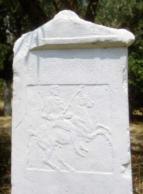BA and Minor in Ancient Greek
A major in Classical Studies — Classical Civilization, Latin, or ancient Greek — provides a well-rounded knowledge of Western culture and traditions. Classical Studies minors (also available in all three fields) can add vital depth to a student's liberal arts education. Both majors and minors are excellent preparations for pre-law or pre-medical programs, business, and other careers: Classical Studies students learn to apply their learning in cross-disciplinary, integrative ways that enable them to capitalize on multidimensional understanding of whole cultures. For more information about career opportunities, visit our Career Resources page and Beyond the B.A.
Students who wish to pursue Classics at the graduate level should take courses in both languages and major in Latin and/or Greek. We have an excellent record for placing our majors in highly ranked graduate programs nationwide. A major or minor in one of the ancient languages is also good preparation for graduate work in related disciplines such as Theology, Ancient History, Philosophy, and Classical Art & Archaeology, or for a career in high school teaching.
In addition to the senior-year capstone course, Humanism of Classical Antiquity, all majors (Classical Civilization, Latin, or ancient Greek) must complete a portfolio that highlights their best work and reflects upon their growth in the program. Contact Dr. Mannering, Undergraduate Programs Director, for more information.
Majors, minors, and degree distinction in the Department of Classical Studies:
- the major and the minor in Classical Civilization
- the major and the minor in Ancient Greek
- the major and the minor in Latin
- the Classics bachelor's degree distinction
We also support several associated interdisciplinary programs.
The Major and Minor in Ancient Greek (*revised* -- in effect fall 2019)

For a major in Greek, students must take at least six courses beyond the elementary Greek sequence, reading ancient Greek literature in Greek. Options include courses on specific authors such as Euripides, Aristophanes and Homer, and on topics such as Greek oratory and historiography. At least two of those courses must be at the 300-level. Majors must also take the year-long senior capstone, "The Humanism of Antiquity." Four electives in ancient Greek, Latin, or classical civilization courses round out the major. The major is thus a total of 36 credit hours. Students can begin the Greek major at Loyola without previous language experience.
The minor in Greek requires four courses at the 200-level or above, plus the first half of the senior capstone, "The Humanism of Antiquity," a total of 15 credit hours.
Upon successful completion of their program, Greek students will
- read Greek at an advanced level
- analyze Greek texts from a variety of genres and contexts
- formulate interpretations based on textual evidence and current scholarly practice
For more information, please contact us.
This page last updated 10 September 2019 by lgawlinski@luc.edu.
A major in Classical Studies — Classical Civilization, Latin, or ancient Greek — provides a well-rounded knowledge of Western culture and traditions. Classical Studies minors (also available in all three fields) can add vital depth to a student's liberal arts education. Both majors and minors are excellent preparations for pre-law or pre-medical programs, business, and other careers: Classical Studies students learn to apply their learning in cross-disciplinary, integrative ways that enable them to capitalize on multidimensional understanding of whole cultures. For more information about career opportunities, visit our Career Resources page and Beyond the B.A.
Students who wish to pursue Classics at the graduate level should take courses in both languages and major in Latin and/or Greek. We have an excellent record for placing our majors in highly ranked graduate programs nationwide. A major or minor in one of the ancient languages is also good preparation for graduate work in related disciplines such as Theology, Ancient History, Philosophy, and Classical Art & Archaeology, or for a career in high school teaching.
In addition to the senior-year capstone course, Humanism of Classical Antiquity, all majors (Classical Civilization, Latin, or ancient Greek) must complete a portfolio that highlights their best work and reflects upon their growth in the program. Contact Dr. Mannering, Undergraduate Programs Director, for more information.
Majors, minors, and degree distinction in the Department of Classical Studies:
- the major and the minor in Classical Civilization
- the major and the minor in Ancient Greek
- the major and the minor in Latin
- the Classics bachelor's degree distinction
We also support several associated interdisciplinary programs.
The Major and Minor in Ancient Greek (*revised* -- in effect fall 2019)

For a major in Greek, students must take at least six courses beyond the elementary Greek sequence, reading ancient Greek literature in Greek. Options include courses on specific authors such as Euripides, Aristophanes and Homer, and on topics such as Greek oratory and historiography. At least two of those courses must be at the 300-level. Majors must also take the year-long senior capstone, "The Humanism of Antiquity." Four electives in ancient Greek, Latin, or classical civilization courses round out the major. The major is thus a total of 36 credit hours. Students can begin the Greek major at Loyola without previous language experience.
The minor in Greek requires four courses at the 200-level or above, plus the first half of the senior capstone, "The Humanism of Antiquity," a total of 15 credit hours.
Upon successful completion of their program, Greek students will
- read Greek at an advanced level
- analyze Greek texts from a variety of genres and contexts
- formulate interpretations based on textual evidence and current scholarly practice
For more information, please contact us.
This page last updated 10 September 2019 by lgawlinski@luc.edu.
